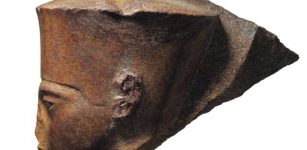Number 13: Coincidence Or Bad Luck – Are We Still Superstitious?
A. Sutherland - AncientPages.com - We are told that 13 is an unlucky number.
Thirteen symbolizes disharmony, disaster, death, ruin, curse, betrayal, contradiction, and non-fulfillment. As the number following the lucky twelve, it has often been considered sinister, unlucky, and holy. In the near East is the number of the underworld, the number destroying the cosmic order.
The date Friday 13, 1307 was a bad day for the Knights Templar. They were arrested by Order Of The King Philippe IV of France and condemned.
Or perhaps was Friday the 13th intentionally chosen as the date of a "pre-dawn raid" to arrest the Templars?
The number 13 has been avoided for centuries. Architects omitted the 13th floor from office buildings to this very day. Do they still do it today?
Is it possible that the folklore associated with the number 13 is nothing but fantasy or superstition? Was this number 'demonized' or 'punished' because it was sacred in pre-Christian times?
Coincidence Or The Number 13's Bad Luck?
According to Pindar, the great Greek lyric poet, and other sources, King Oenomaus of Pisa, who had an incestuous love for his daughter Hippodamia, killed his daughter's thirteen suitors.
We cite Phyllis G. Jestice in "Holy People of the World":
"near the end of Philip's life, the orator Isocrates wrote, "Having united Greece… the only thing left you would be to become a God" (Epistles 3.5.) On the morning of his assassination in 336, at the grand festival celebrating his planned invasion of Persia, Philip's fateful – and fatal – entrance into the Aegean theater was proceeded by thirteen statues on wagon bases: twelve Olympians, and Philip himself, whose statue was no smaller than that of the gods…."
The statues of the 12 Olympian gods followed by a figure of Philip himself enthroned are also mentioned in another version saying that it happened at a luxurious celebration he organized for his daughter's wedding to the king of Epirus, Alexander's uncle. The lavish wedding ceremony concluded with a procession bearing statues of immortals now accompanied by the thirteen's "god" - Philip.
It was not the best day for King Philip, or perhaps the number 13 was fatal and did not bring him much luck. While entering the town's theatre, Philip was assassinated by Pausanias of Orestis, one of his seven bodyguards.
This historical event took place a very long time ago. In the meantime, the number 13 continuously influenced people's life.
Can The Number 13 Be A Lucky Number?
Thirteen can be a lucky number too, but we have to add to number 12 a great personality like, for example, King Arthur and the twelve Knights of the Round Table, or Charlemagne and the twelve Paladins (or Twelve Peers) who according to legend, are the notable members of Charlemagne's court in the 8th century.
Numerous talismans are decorated with the image of the number 13, and in many traditions, Friday is a holy day.
The Number 13 Has A Few Biblical Associations
Not all the numbers have many references in the Bible. Thirteen was the sacred number of the Mexicans and Yucatan people, and it had an astronomical connection in their beliefs because the stars and the Sun were considered Gods by them.
In Yucatan, there were 13 "Snake Gods." In the Nahua people's beliefs, such as the Aztecs, Chichimecs, and the Toltecs, the heavens were constructed and separated into 13 levels. Each level had from one to many Lords (gods) living in and ruling them.
In Tibetan and Mongolian cultures, the 13 also plays a significant role in Tibetan cosmology, religion, and history. Based on ancient records, the early kings would begin to rule at the age of thirteen in Tibet, divided into thirteen districts. Likewise, in Mongolian culture, thirteen was also considered a lucky number, especially among travelers. In religious contexts, the Mongolians used the number thirteen to categorize the primordial gods of their society.
In Egyptian beliefs, this number was also significant, as there are thirteen steps for Egyptians to take between life and death.
The Number 13 In Norse Mythology
In Norse mythology, a dinner party's story tells about a banquet in Valhalla, where a trickster god Loki makes an unpleasant appearance. He crashes this feast and kills one of the guests (Balder) with an arrow. This major event in Norse mythology caused the number 13 to be considered unlucky, and this superstition spread to many countries.
Many people consider themselves superstitious. It is relatively common to see people avoid the number 13 in and around elevators, hotels, airlines, and other places. They even know the unluckiness of having thirteen guests at the dinner table.
In non-religious or non-mythical environments, the number 13 is also prominent. In Germany and France, there are often street numbers 12, except the number thirteen. It happens that the Americans choose to omit the number thirteen and put superstition on the number. Frequently this is the case with Friday the 13th and the lack of the 13th floor in many hotels.
Hebrew ancient lore did not reckon the number 13 as unlucky; this idea arose from the fate of Judas after the Last Supper of Jesus, yet not for some centuries, but since the notion was started, it has been prevalent among all Christians. 1
13 was a number central to certain sacred geometry traditions because it reflected a pattern that could be seen to exist in man, nature, and the heavens.
Updated on May 13, 2022
Written by – A. Sutherland - AncientPages.com Senior Staff Writer
Copyright © AncientPages.com All rights reserved. This material may not be published, broadcast, rewritten or redistributed in whole or part without the express written permission of AncientPages.com
Expand for referencesReferences:
Phyllis G. Jestice (edited), Holy People of the World
- Wynn Westcott. Numbers, Their Occult Power, and Mystic Virtues
More From Ancient Pages
-
 Secrets Of The Lost Tomb X – Enigmatic Boxes And Unusual Samples – Part 2
Ancient Mysteries | Apr 12, 2019
Secrets Of The Lost Tomb X – Enigmatic Boxes And Unusual Samples – Part 2
Ancient Mysteries | Apr 12, 2019 -
 Alexander The Great And The Prophecy Of The Tree Of The Sun And Moon
Featured Stories | Jun 10, 2019
Alexander The Great And The Prophecy Of The Tree Of The Sun And Moon
Featured Stories | Jun 10, 2019 -
 Fairies Weren’t Always Cute – They Used To Drink Human Blood And Kidnap Children
Featured Stories | Oct 15, 2022
Fairies Weren’t Always Cute – They Used To Drink Human Blood And Kidnap Children
Featured Stories | Oct 15, 2022 -
 Mysterious Advanced Underground Civilization And A Secret Society – Dangerous Knowledge And Verdict – Part 3
Ancient Mysteries | Apr 24, 2018
Mysterious Advanced Underground Civilization And A Secret Society – Dangerous Knowledge And Verdict – Part 3
Ancient Mysteries | Apr 24, 2018 -
 3,000-Year-Old Tutankhamun’s Head Sculpture Is Expected To Be Sold On Thursday In London
Archaeology | Jul 2, 2019
3,000-Year-Old Tutankhamun’s Head Sculpture Is Expected To Be Sold On Thursday In London
Archaeology | Jul 2, 2019 -
 Food And Clothing Of Middle Class Of The Sumerian Society
Ancient History Facts | Aug 2, 2017
Food And Clothing Of Middle Class Of The Sumerian Society
Ancient History Facts | Aug 2, 2017 -
 Oklahoma’s Mysterious Hollow Hill – Hidden Artifact Reveals A Frightening Story – Part 1
Ancient Mysteries | Jul 8, 2020
Oklahoma’s Mysterious Hollow Hill – Hidden Artifact Reveals A Frightening Story – Part 1
Ancient Mysteries | Jul 8, 2020 -
 Bayeux Tapestry May Have Served As Monks’ Mealtime Reading, New Study Suggests
Archaeology | Dec 16, 2025
Bayeux Tapestry May Have Served As Monks’ Mealtime Reading, New Study Suggests
Archaeology | Dec 16, 2025 -
 Ehecatl: The Snake-Bird Deity And God Of Wind Feared And Respected By The Aztecs
Aztec Mythology | Aug 26, 2016
Ehecatl: The Snake-Bird Deity And God Of Wind Feared And Respected By The Aztecs
Aztec Mythology | Aug 26, 2016 -
 Breakthrough – First Glimpse Into A 2,000-Year-Old Charred Herculaneum Scroll
Linguistic Discoveries | Feb 7, 2025
Breakthrough – First Glimpse Into A 2,000-Year-Old Charred Herculaneum Scroll
Linguistic Discoveries | Feb 7, 2025 -
 Archaeological Finds Shed New Light On The Paleo Diet Habits Of Ancient Hunter-Gatherers
Archaeology | Jan 13, 2025
Archaeological Finds Shed New Light On The Paleo Diet Habits Of Ancient Hunter-Gatherers
Archaeology | Jan 13, 2025 -
 Mystery Of The Lydenburg Heads
Artifacts | Jun 13, 2014
Mystery Of The Lydenburg Heads
Artifacts | Jun 13, 2014 -
 Arborglyphs – Basque Immigrant Sheepherders Left Their Marks On Aspen Trees In The American West
Featured Stories | Jul 15, 2024
Arborglyphs – Basque Immigrant Sheepherders Left Their Marks On Aspen Trees In The American West
Featured Stories | Jul 15, 2024 -
 Abundantia: Roman Goddess Who Was Shaking Her Gifts From Cornucopia – ‘Horn Of Plenty’
Featured Stories | Nov 4, 2019
Abundantia: Roman Goddess Who Was Shaking Her Gifts From Cornucopia – ‘Horn Of Plenty’
Featured Stories | Nov 4, 2019 -
 Mysterious Ancient Lost Civilization Of North America Had Interest In One Particular Constellation
Ancient Mysteries | Apr 17, 2018
Mysterious Ancient Lost Civilization Of North America Had Interest In One Particular Constellation
Ancient Mysteries | Apr 17, 2018 -
 Evidence Of Beer Drinking 9,000 Years Ago In Southern China Discovered
Archaeology | Sep 1, 2021
Evidence Of Beer Drinking 9,000 Years Ago In Southern China Discovered
Archaeology | Sep 1, 2021 -
 Lost World Of Doggerland: Parts Of Britain’s Sunken Stone Age Atlantis Discovered
Archaeology | Jul 4, 2012
Lost World Of Doggerland: Parts Of Britain’s Sunken Stone Age Atlantis Discovered
Archaeology | Jul 4, 2012 -
 Encounter Between Neanderthals And Homo Sapiens – Genome Study Traces The History
DNA | Oct 18, 2023
Encounter Between Neanderthals And Homo Sapiens – Genome Study Traces The History
DNA | Oct 18, 2023 -
 10 Surprising Facts About The Neanderthals Who Were Not As Primitive As Previously Thought
Ancient History Facts | May 6, 2017
10 Surprising Facts About The Neanderthals Who Were Not As Primitive As Previously Thought
Ancient History Facts | May 6, 2017 -
 Charles VI Of France – The King Who Was Made Of Glass
Featured Stories | Jan 22, 2016
Charles VI Of France – The King Who Was Made Of Glass
Featured Stories | Jan 22, 2016

